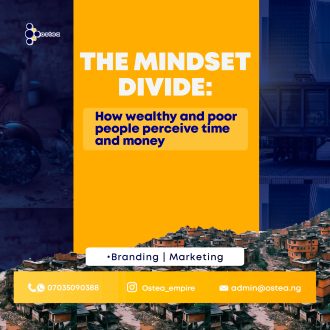
One of the most profound differences between wealthy and poor individuals lies not in their bank accounts, but in their mindsets—particularly in how they perceive time and money. The rich view money as a tool to buy time, while the poor often see time as a tool to earn money. This fundamental difference in perception is one of the key reasons why the rich tend to get richer, and the poor, unfortunately, often struggle to break free from the cycle of poverty.
Wealthy individuals understand that time is the most precious resource. Unlike money, which can be earned, invested, and multiplied, time is finite. Every second that passes is one that can never be regained. Therefore, the wealthy prioritize activities that free up their time, allowing them to focus on high-value tasks or simply enjoy life.
For example, a successful entrepreneur might hire a personal assistant to manage their schedule, a housekeeper to take care of household chores, and a financial advisor to handle investments. By outsourcing these tasks, they gain more time to focus on their business, explore new opportunities, or spend time with family and friends. This delegation allows them to maximize their productivity and, in turn, generate even more wealth.
The rich also invest in assets that generate passive income—such as real estate, stocks, or businesses. These investments earn money with minimal ongoing effort, further freeing up their time. Over time, this creates a cycle where their money works for them, continually expanding their wealth while they focus on other pursuits.
On the other hand, those with less financial means often view time as a resource that must be spent to earn money. The idea of trading hours for dollars is ingrained in many, leading them to work long hours, often at multiple jobs, just to make ends meet. This mindset is understandable, especially in situations where immediate financial needs are pressing. However, it can also trap individuals in a never-ending cycle of labor.
When time is viewed primarily as a means to earn money, it can be difficult to step back and consider ways to use money to create more time. The focus is often on immediate, short-term gains—working extra shifts, taking on side gigs, or cutting back on personal time to increase income. While these efforts can provide short-term financial relief, they often leave little room for long-term wealth-building activities, such as investing in education, developing new skills, or exploring entrepreneurial opportunities.
This approach can also lead to burnout, as the constant need to work more hours leaves little time for rest, relaxation, or strategic thinking about the future. Without time to reflect, plan, and take calculated risks, it becomes challenging to escape the cycle of trading time for money.
To bridge the gap between these two mindsets, it’s essential to shift the way time and money are perceived. Here are a few strategies to consider:
1. Invest in Skills and Education: Instead of only focusing on immediate income, consider investing time and money into learning new skills or gaining additional education. This can open doors to higher-paying jobs or entrepreneurial ventures that require less time but offer greater financial rewards.
2. Focus on High-Value Activities: Identify tasks that have the most significant impact on your financial goals and prioritize them. Delegate or eliminate low-value tasks that consume time but don’t contribute to long-term wealth.
3. Build Passive Income Streams: Look for opportunities to create passive income through investments, side businesses, or other ventures that can generate money without constant effort. Even small, incremental steps in this direction can build momentum over time.
4. Reframe Time as a Valuable Asset: Recognize that time is more valuable than money because it is finite. By valuing your time more highly, you may find it easier to make decisions that prioritize long-term financial stability over short-term gains.
Conclusion
The way we perceive time and money plays a critical role in shaping our financial outcomes. While the rich tend to use money as a tool to buy time, allowing them to focus on wealth-generating activities, the poor often feel compelled to trade their time for money, leaving little room for growth and opportunity. By shifting our mindset and strategies, it is possible to break free from this cycle and build a more prosperous future.